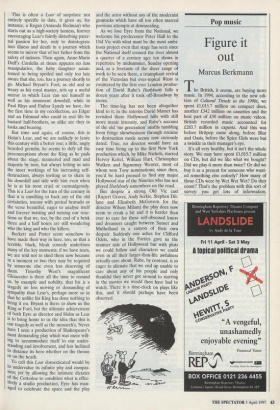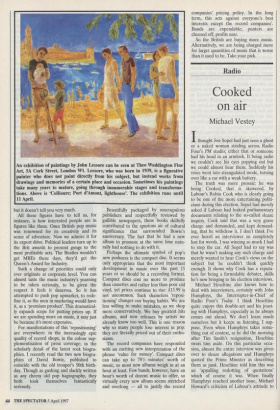Pop music
Figure it out
Marcus Berkmann
The British, it seems, are buying more music. In 1994, according to the new edi- tion of Cultural Trends in the 1990s, we spent £1,015.7 million on compact discs, another £342 million on cassettes and the best part of £50 million on music videos. British recorded music accounted for £283.7 million in exports. And this was before Britpop came along, before Blur and Oasis, before the Spice Girls were but a twinkle in their manager's eye.
It's all very healthy, but it isn't the whole story. We may have spent £1,015.7 million on CDs, but did we like what we bought? Did we play it more than twice? Or did we buy it as a present for someone who want- ed something else entirely? How many of those CDs were by Wet Wet Wet? Do they count? That's the problem with this sort of survey: you get lots of information, An exhibition of paintings by John Lessore can be seen at Theo Waddington Fine Art, 5A Cork Street, London Wl. Lessore, who was born in 1939, is a figurative painter who does not paint directly from his subject, but instead works from drawings and memories of a certain place and occasion. Sometimes his paintings take many years to mature, going through innumerable stages and transforma- tions. Above is `Collioure; Port d'Amont, lighthouse'. The exhibition runs until 11 April.
but it doesn't tell you very much.
All these figures have to tell us, for instance, is how interested people are in figures like these. Once British pop music was renowned for its creativity and its sense of adventure. Now we admire it for its export drive. Political leaders turn up to the Brit awards to present gongs to the most profitable acts. The Beatles wouldn't get MBEs these days, they'd get the Queen's Award for Industry.
Such a change of priorities could only ever originate at corporate level. You can almost taste the music industry's yearning to be taken seriously, to be given the respect it feels it deserves. So it has attempted to push pop upmarket, to rede- fine it, as the men in marketing would have it, as a 'premium product'. This dramatical- ly expands scope for putting prices up. If we are spending more on music, it may just be because it's more expensive.
For manifestations of this 'repositioning' are everywhere: in the increasingly epic quality of record shops; in the colour sup- plementisation of press coverage; in the scholarly detail of the latest rock biogra- phies. I recently read the two new biogra- phies of David Bowie, published to coincide with the old trouper's 50th birth- day. Though as gushing and slackly written as any cheesy old pop hagiography, they both took themselves fantastically seriously. Beautifully packaged by unscrupulous publishers and respectfully reviewed by gullible newspapers, these books skilfully contributed to the spurious air of cultural significance that surrounded Bowie's anniversary. The fact that he had a new album to promote at the same time natu- rally had nothing to do with it.
Perhaps the ultimate symbol of pop's new poshness is the compact disc. It seems only appropriate that the most important development in music over the past 15 years or so should be a recording format. Compact discs cost no more to produce than cassettes and rather less than poor old vinyl, yet prices continue to rise: £15.99 is not uncommon. Such shameless 'reposi- tioning' changes our buying habits. We are less willing to make mistakes, so we shop more conservatively. We buy greatest hits albums, and new releases by artists we already know too well. This is one reason why so many people lose interest in pop: they are literally priced out of their enthu- siasm.
The record companies have responded with an exciting new interpretation of the phrase 'value for money'. Compact discs can take up to 78'/2 minutes' worth of music, so most new albums weigh in at an hour at least. Few bands, however, have an hour's worth of decent music to offer, so virtually every new album seems stretched and overlong — all to justify the record companies' pricing policy. In the long term, this acts against everyone's best interests except the record companies'. Bands are expendable; punters are cheesed off; profits soar.
So the British are buying more music. Alternatively, we are being charged more for larger quantities of music that is worse than it used to be. Take your pick.



























































 Previous page
Previous page